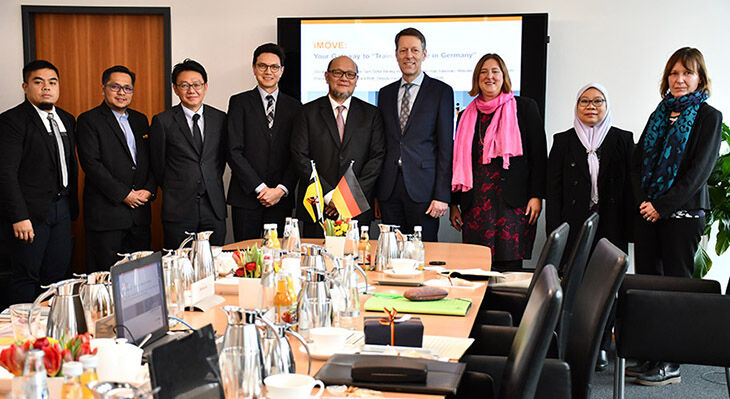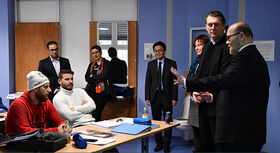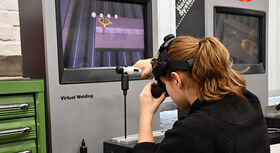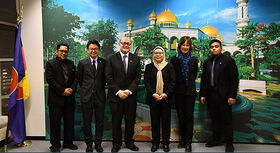The dual system of vocational education and training thrills the Minister of Education of Brunei
A visit to Berlin by the Minister of Education of Brunei at the end of January showed just how untypical the dual VET system is in other parts of the world. State Secretary Schütte received the minister at the BMBF German Ministry of Education to engage in detailed discussions on vocational education and training. The guests also expressed a targeted interest in networking opportunities for teachers and learners and in education and training provision.
How does Germany manage to get companies on board to provide training, and why do they contribute voluntarily to the costs?” was one of the first questions which Brunei’s Minister of Education Hamzah bin Haji Sulaiman put to State Secretary Dr. Georg Schütte (Federal Ministry of Education and Research, BMBF). This is an issue that was to crop up regularly during the Brunei delegation’s two-day programme in Berlin. The guests met vocational school principals, trainers, companies, chambers, training providers, trainees and master craftsman pupils in the city and were repeatedly impressed by the degree of coordination that takes place in cooperation between learning venues and by the complex structures within the German VET system. In Brunei and other countries, responsibility based on a spirit of partnership and the investments made in skilled worker training by numerous stakeholders as a result of this approach are anything but typical.
The four-strong Brunei delegation comprised high ranking representatives from the government and from national technical vocational education and training (TVET) institutions. The study visit tour began at the BMBF in Berlin, where the group was welcomed by State Secretary Dr. Georg Schütte in the company of Hajah Rakiah binti Haji Abdul Lamit, Brunei’s Ambassador to Germany. GOVET and iMOVE joined forces with Birgit Thomann, Head of the “VET International” department at BIBB, to provide a technical introduction.
Vocational education and training that delivers sustainability
Vocational education and training in Brunei is undergoing a comprehensive reform process as the country seeks to meet economic development needs and technological change and achieve the UN’s goals for sustainable development, to which it aligns itself closely. Brunei launched the implementation of its national development objectives by founding the Institute of Brunei Technical Education (IBTE) in 2014. These targets are defined in a white paper entitled “Transformation of Technical Vocational Education and Training”. TVET and the question of how sustainable innovations can initiate the systematic and quality-oriented further development of occupational profiles play a key role in Brunei. The hope is that high-quality training can act as a vehicle for generating expertise and impetus in the companies. The aim is to reveal the added value of good training both to young people in the VET orientation phase and to the firms and to use this to drive development.
Brunei has a well-established and profitable gas and oil industry which is of the opinion that responsibility for providing qualified skilled workers rests with the state. In order to be able to offer young people a genuine choice, the country has moved away from supply-based approach to embrace a more demand-oriented view of training prospects. “In order to secure a long-term benefit for the individual, for the economy, for society and for the country as a whole,” stated Deputy State Secretary Dr. Chin Weih Keh during the discussions with GOVET, “we need vocational education and training that is high-end in terms of quality.” He also believes that it is necessary to bring about a rethink within industry. The establishment of selected pilot business segments could help lead to a new culture of training, skills and quality which features dual structures. There are good examples from cooperation countries that show this to be possible.
Training centres and vocational schools demonstrate impressive progress and competence
One of the venues where the guests from Brunei were able to gather ideas and technical guidance was the Centre of Excellence run by the Sanitary, Heating, Plumbing and Air Conditioning Systems Guild (SHK). The SHK has joined forces with the “Craft Trades Future” Foundation to help teach young skilled workers the expertise they require. It uses state-of-the-art technology to advise and train experts from all over Germany and abroad. The delegates went on to visit training centres specialising in the automobile sector and in other craft trades, and these ports of call also provided impressive evidence of just how wide-ranging and differentiated today’s specialist training has become. Digitalised training aids are able to offer remarkable possibilities.
However, the highly committed school principals and heads of training also reported on some of the real world problems faced in vocational education and training. Investment in the motivation and support of young people who still need guidance in some cases costs resources, patience and persuasive effort. But the delegation was able to see that such endeavours pay off. The group met large numbers of highly motivated young men and women who made a striking impact thanks to their very good command of technical English, the way in which they were able to reflect upon their own career pathways, and the enthusiasm they displayed for their occupations. Stories such as those of a trainee mechatronics fitter at an upper secondary school centre specialising in motor vehicle engineering, showed that motivation to train in a particular occupation can be related to events in life and is therefore often unpredictable. “I had a car accident and didn’t know how I would be able to pay the expensive repair bill,” said Kimberly. “So I thought, next time I’ll fix it myself!” State Secretary Schütte and all the hosts involved essentially had the same message for the visiting delegates. The high degree of permeability and flexibility which exists at many points of the (vocational) education system in Germany are crucial criteria for securing high rates of employment and skilled worker training.
Partnerships, networks and prognoses along the path to TVET reform
At the end of the visit, the Brunei delegation’s desire for networking and cooperation with German training centres, training providers and companies was both confirmed and reinforced. “As a small country with limited sector diversity, Brunei could benefit from […] building up partnerships with German vocational schools,” summarised the Brunei government representative Dr. Chin Wei Keh, “because they have great proximity to the companies, branches and their products.[…] We now need to find the right persons and mechanisms and bring dual training expertise to our country.”
GOVET staff member Dr. Hannelore Kress had initially made contact with Dr. Chin Wei Keh, who is highly committed to TVET, at an ASEM workshop in Riga in 2018. With regard to potential further steps to be taken, Dr. Kress recommended the delegation to seek closer networking in the ASEAN region, where active VET cooperation agreements and initiatives already exist in countries such as Vietnam and Singapore. The German embassy has also established a vocational education and training round table in Kuala Lumpur (Malaysia). GOVET offered specific support in the form of a possible Summer School to look at data collection methods in the area of labour market analysis and TVET requirements. It became clear that evidence-based medium to long-term prognoses, particularly with regard to human resources capacities, were one of the key instruments of coherent TVET strategy development.



